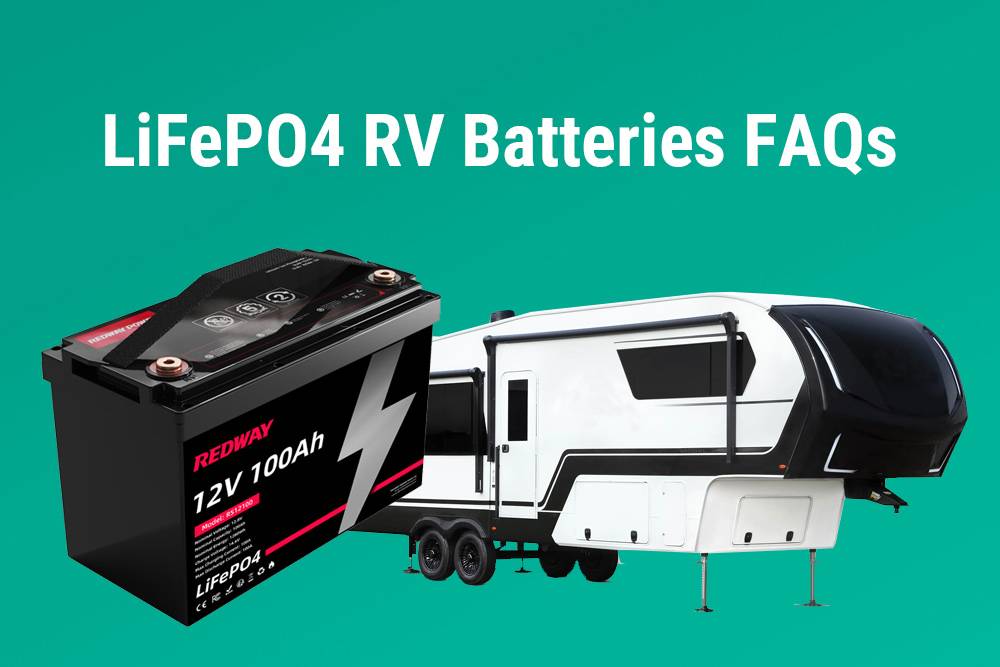RV batteries are essential components of recreational vehicles (RVs) that provide electrical power for various onboard systems and appliances. These batteries store energy generated from external sources like shore power, generators, or solar panels, allowing RV owners to operate lights, water pumps, appliances, entertainment systems, and other electrical devices while off-grid or when not connected to shore power.
Check the Lithium LiFePO4 RV Batteries FAQs below.
Are RV lithium batteries worth the cost?
RV lithium batteries offer several advantages over traditional lead-acid batteries, including longer lifespan, faster charging times, and higher energy density. While they do come with a higher upfront cost, their durability and superior performance often justify the investment, particularly for frequent RV users who value reliable power sources. To determine if RV lithium batteries are worth it for you, consider factors such as your RV usage frequency, power requirements, and long-term plans for your vehicle. Evaluating these factors will help you determine if the benefits of lithium batteries outweigh their initial expense in the context of your specific needs and circumstances.
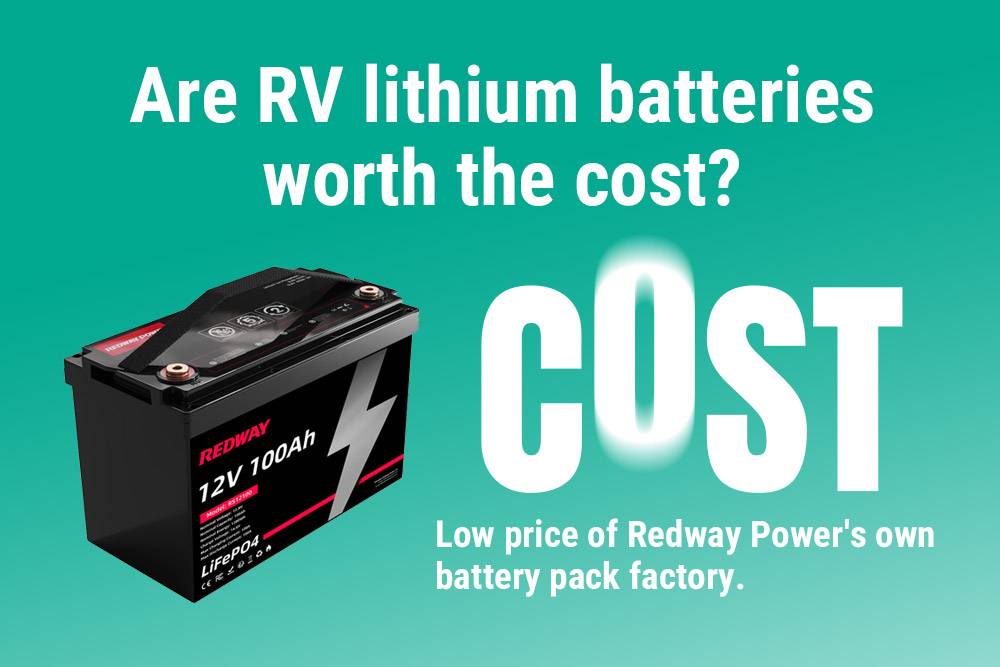
How long will a single LiFePO4 battery last in an RV?
The lifespan of a single LiFePO4 battery in an RV can vary depending on factors such as usage patterns, charging practices, and the size/capacity of the battery. Generally, LiFePO4 batteries have a longer lifespan compared to lead-acid batteries, with many lasting several years or even a decade with proper care and maintenance. However, it’s essential to monitor the battery’s state of charge, avoid deep discharges, and follow manufacturer recommendations to maximize its longevity.
How to recharge lithium batteries in an RV?
Recharging lithium batteries in an RV is similar to recharging other battery types but with some considerations. You can recharge them using various methods, including shore power, solar panels, generators, or alternators while driving. Ensure your RV’s charging system is compatible with lithium batteries, use a lithium battery charger if needed, and follow manufacturer guidelines for charging voltage and current limits to avoid damaging the batteries.
How to charge a RV lithium battery from a vehicle battery?
Charging an RV lithium battery from a vehicle battery typically involves connecting the two batteries using suitable cables and a charge controller if necessary. You can charge the RV lithium battery from the vehicle’s alternator while driving or using a battery isolator to prevent draining the vehicle’s starting battery. Ensure proper wiring, use appropriate charging equipment, and follow safety precautions to prevent overcharging or damaging either battery.
Where to buy lithium batteries for RV?
Lithium batteries for RVs are available from various sources, including online retailers, specialty RV stores, and manufacturers’ websites. Before purchasing, consider factors such as battery specifications, warranty, and customer reviews. Ensure compatibility with your RV’s electrical system and consult with professionals if needed to make an informed decision.
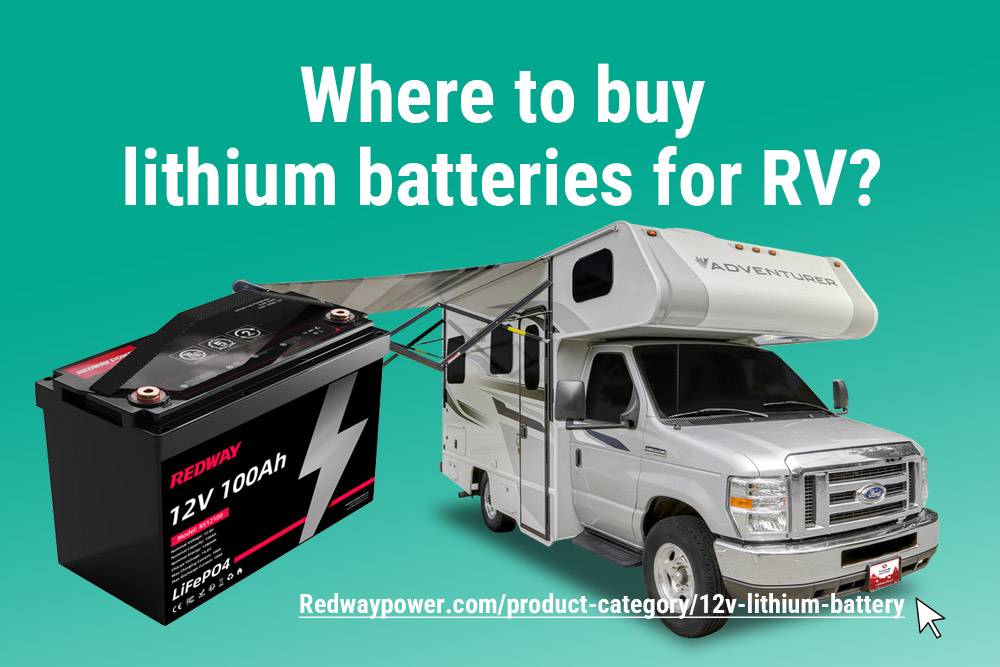
Should I vent my lithium RV batteries?
Lithium RV batteries generally do not require venting like lead-acid batteries because they do not produce gases during operation. However, if your lithium battery system includes a built-in battery management system (BMS) that monitors and regulates battery temperature, it may have provisions for venting in case of extreme conditions. Consult your battery manufacturer’s recommendations and local regulations to determine if venting is necessary for your specific setup.
How to convert from lead acid to lithium battery in an RV?
Converting from lead-acid to lithium batteries in an RV involves several steps, including selecting the right lithium battery system, replacing the existing batteries, updating the charging system if necessary, and ensuring proper wiring and configuration. It’s essential to follow manufacturer guidelines, consult professionals if needed, and consider factors such as battery capacity, voltage compatibility, and charging requirements for a successful conversion.
What does amp/hour mean for a lithium RV battery?
Ampere-hour (Ah) is a unit of measurement commonly used to specify the capacity of a battery, including lithium RV batteries. It represents the amount of charge a battery can deliver over time. For example, a lithium RV battery with a capacity of 100Ah can theoretically deliver a current of 1 ampere for 100 hours, 2 amperes for 50 hours, and so on, before reaching its discharged state. Higher Ah ratings indicate larger battery capacity and longer runtime.
What are the best lithium batteries for an RV?
The best lithium batteries for an RV depend on factors such as budget, power requirements, space constraints, and desired features. Popular brands include Battle Born, Renogy, and Victron Energy, known for their reliability, performance, and customer support. Consider factors such as battery capacity, voltage compatibility, warranty, and user reviews when selecting the best lithium battery for your RV.
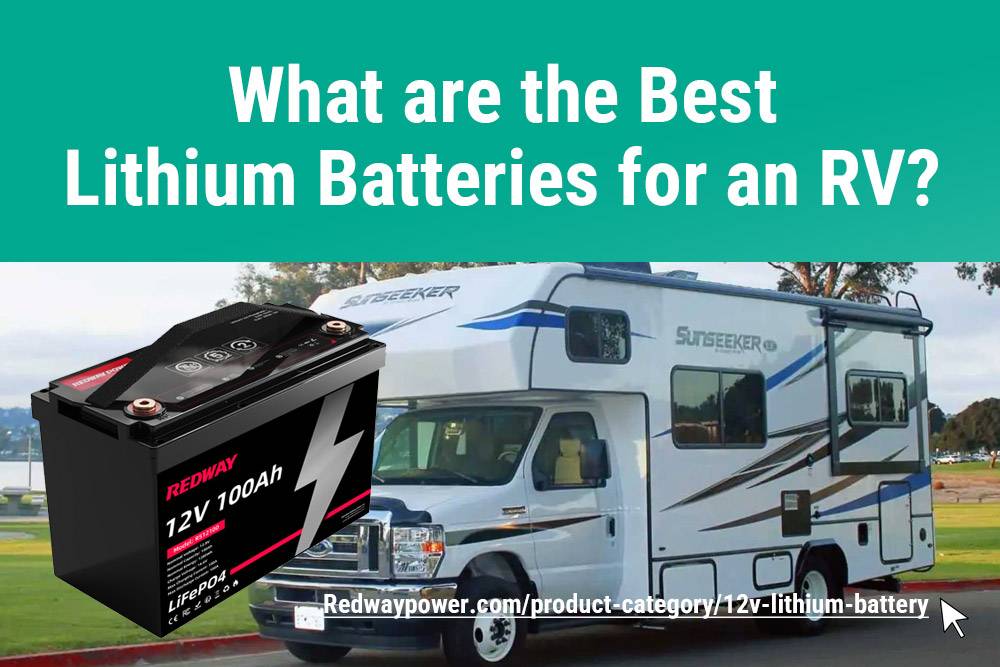
Can you freeze damage a lithium RV battery?
Lithium RV batteries are generally more resistant to extreme temperatures, including freezing, compared to lead-acid batteries. However, exposing lithium batteries to extremely low temperatures for extended periods can affect their performance and lifespan. It’s essential to follow manufacturer recommendations for storage and operation temperatures and take precautions to protect the batteries from freezing if camping in cold climates, such as insulating battery compartments or using battery heaters.
How to store lithium RV batteries for winter?
Storing lithium RV batteries for winter involves several steps to protect them from damage due to freezing temperatures and inactivity. Disconnect the batteries from the RV’s electrical system, ensure they are fully charged, and store them in a cool, dry location away from direct sunlight. If storing them in the RV, consider using battery maintainers or heaters to prevent freezing and maintain optimal battery health. Follow manufacturer guidelines and consult professionals if needed to ensure proper storage procedures.
Can one 12V lithium-ion battery power an RV?
A single 12V lithium-ion battery can power some components of an RV, depending on their energy requirements and the battery’s capacity. However, powering an entire RV solely with one 12V lithium-ion battery may not be practical due to the high energy demands of appliances, electronics, and onboard systems. It’s essential to assess your RV’s power needs, consider adding multiple batteries or alternative power sources, and consult professionals to design a reliable and efficient power system for your RV.
Can all RVs use lithium RV batteries in 2024?
Most modern RVs can use lithium RV batteries with some modifications or upgrades to the existing electrical system. However, compatibility depends on factors such as voltage requirements, charging methods, and space constraints. Older RVs may require more extensive modifications to accommodate lithium batteries, such as upgrading the charging system, wiring, and battery monitoring equipment. Consult with professionals and consider your RV’s specifications and requirements before switching to lithium batteries.
How to install a lithium battery in an RV?
Installing a lithium battery in an RV involves several steps to ensure proper integration, performance, and safety. First, select a suitable location for the battery, considering factors such as ventilation, accessibility, and weight distribution. Install battery mounts or brackets to secure the battery in place, connect the battery to the RV’s electrical system using appropriate cables, fuses, and terminals, and configure charging and monitoring equipment as needed. Follow manufacturer guidelines, consult professionals if necessary, and conduct thorough testing to verify proper installation and functionality.
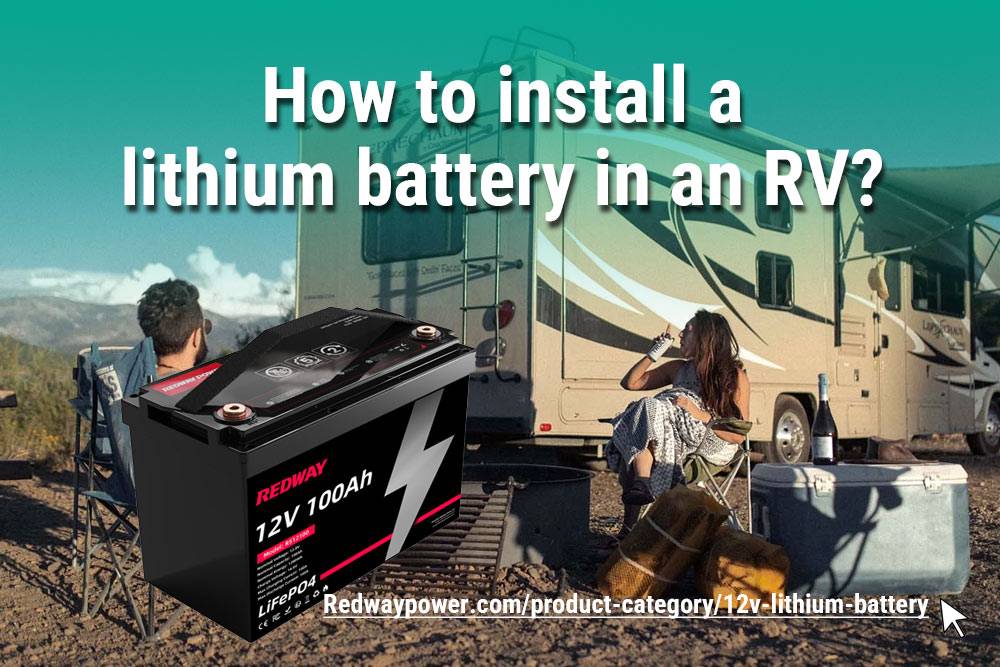
How long do lithium-ion RV batteries last?
The lifespan of lithium-ion RV batteries varies depending on factors such as usage patterns, charging practices, temperature conditions, and battery maintenance. In general, lithium-ion batteries have a longer lifespan compared to lead-acid batteries, with many lasting several years or even a decade with proper care and maintenance. Regularly monitor the battery’s state of charge, avoid deep discharges, and follow manufacturer recommendations to maximize its longevity and performance.
How much solar on an RV for a 200Ah lithium battery?
The amount of solar power needed for a 200Ah lithium battery in an RV depends on factors such as daily energy consumption, geographical location, and solar panel efficiency. As a general guideline, a 200W to 400W solar panel system can typically recharge a 200Ah lithium battery adequately, assuming average sunlight conditions and moderate energy consumption. However, it’s essential to assess your specific power requirements, consider factors like shading and tilt angle, and consult professionals for a customized solar setup that meets your needs.
How to keep RV lithium batteries warm in winter?
Keeping RV lithium batteries warm in winter involves several strategies to prevent freezing and maintain optimal battery performance. Insulate battery compartments or enclosures to retain heat, use battery heaters or thermal blankets designed for lithium batteries to provide additional warmth, and consider installing temperature monitoring systems to track battery temperatures remotely. It’s essential to follow manufacturer guidelines, avoid exposing batteries to extreme temperatures, and take precautions to prevent damage due to cold weather conditions.
How to hook up a lithium-ion battery to run RV power?
Hooking up a lithium-ion battery to run RV power involves connecting the battery to the RV’s electrical system using appropriate cables, fuses, and terminals. Determine the battery’s voltage and capacity requirements, select suitable components such as inverters, converters, and charge controllers, and wire them according to manufacturer guidelines and electrical codes. Consider factors like load distribution, wiring protection, and safety precautions to ensure a reliable and safe power setup for your RV.
FAQs
How Do Lithium Batteries Charge Compared to RV Batteries?
How Does Lithium Voltage Consistency Compare to Lead-Acid?
What Are the RV Benefits of Lithium-Ion Battery’s Lower Weight?
How Does Lithium-Ion Battery Life Cycle Compare to Lead-Acid?
More FAQs
Is it OK to leave RV plugged in all the time? Leaving the RV plugged in all the time is generally fine, especially if it’s equipped with a smart charger that adjusts the charging rate to prevent overcharging. However, periodic checks on the battery’s electrolyte level and overall condition are recommended.
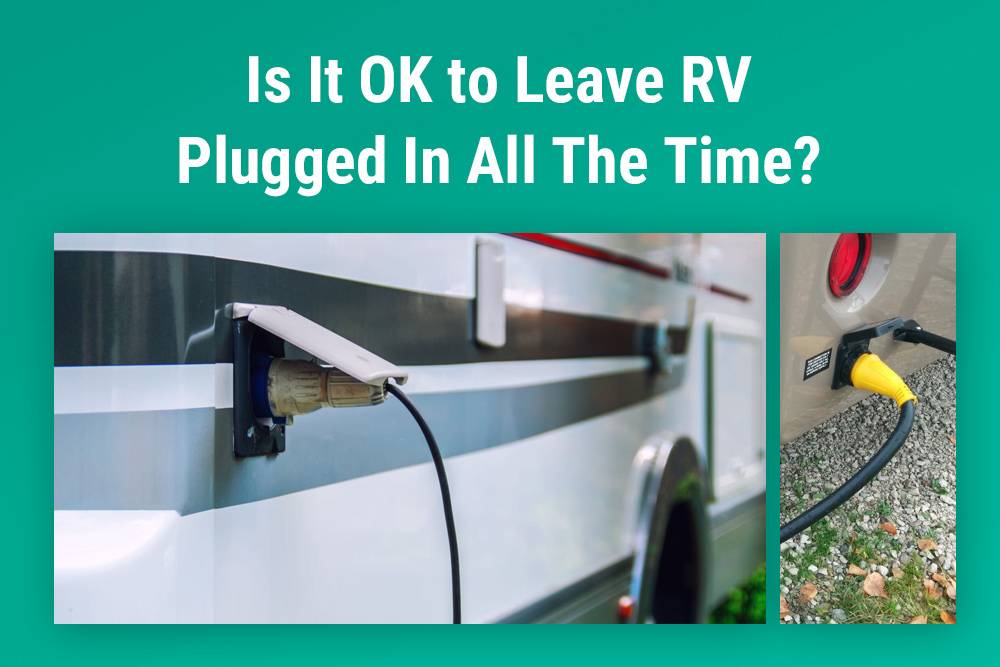
Do RV batteries drain when not in use? Yes, RV batteries can still drain when not in use due to parasitic loads such as propane detectors, clocks, or electronic devices. Disconnecting the battery or using a battery disconnect switch can help prevent unnecessary drainage.
What are the three types of RV batteries? The three main types of RV batteries are lead-acid batteries (flooded, AGM, or gel), lithium-ion batteries, and absorbed glass mat (AGM) batteries. Each type has its own advantages and disadvantages in terms of cost, lifespan, and performance.
Can you overcharge an RV battery? Yes, overcharging an RV battery can lead to damage, decreased lifespan, and potential safety hazards. It’s crucial to use a reliable charger or converter with proper voltage regulation to prevent overcharging.
Should I remove the battery from my RV batteries for winter? Removing the RV battery for winter storage is advisable to prevent damage from freezing temperatures and to ensure proper maintenance. Alternatively, storing the RV in a climate-controlled environment or using a battery tender can also help protect the battery during winter.
Should I keep my RV battery on a trickle charger? Using a trickle charger or battery maintainer can be beneficial for maintaining RV batteries during storage periods or when not in use for extended periods. It helps keep the battery charged without overcharging, prolonging its lifespan.
How do I know if my RV converter is charging my battery? You can check if your RV converter is charging the battery by measuring the voltage across the battery terminals using a multimeter. When the converter is charging, the voltage should be higher than the battery’s resting voltage.
What charges RV battery when plugged in? When plugged into shore power, the RV converter or inverter charger typically charges the RV battery by converting AC power from the campground’s electrical supply into DC power to charge the battery.
How do I keep my RV battery charged when not in use? Keeping the RV battery charged when not in use can be achieved by using a trickle charger, solar panel system, or disconnecting parasitic loads to prevent unnecessary drainage.
What can I run off my RV battery? RV batteries can power various onboard systems and appliances, including lights, water pumps, fans, entertainment systems, and some kitchen appliances like microwaves or coffee makers.
What is normal charge for RV battery? A normal charge for an RV battery typically ranges between 13.2 and 14.4 volts when the battery is being charged. This voltage level indicates that the battery is receiving a sufficient charge.
Will a RV converter charge a dead battery? In most cases, an RV converter can charge a dead battery, but it may take some time depending on the battery’s condition and level of discharge. It’s essential to ensure that the converter is functioning correctly and providing the proper charging voltage.
Why is my RV battery not charging when plugged into shore power? Several factors could cause an RV battery not to charge when plugged into shore power, including faulty wiring, a malfunctioning converter, or a blown fuse. It’s essential to diagnose and address the issue promptly to avoid further damage.
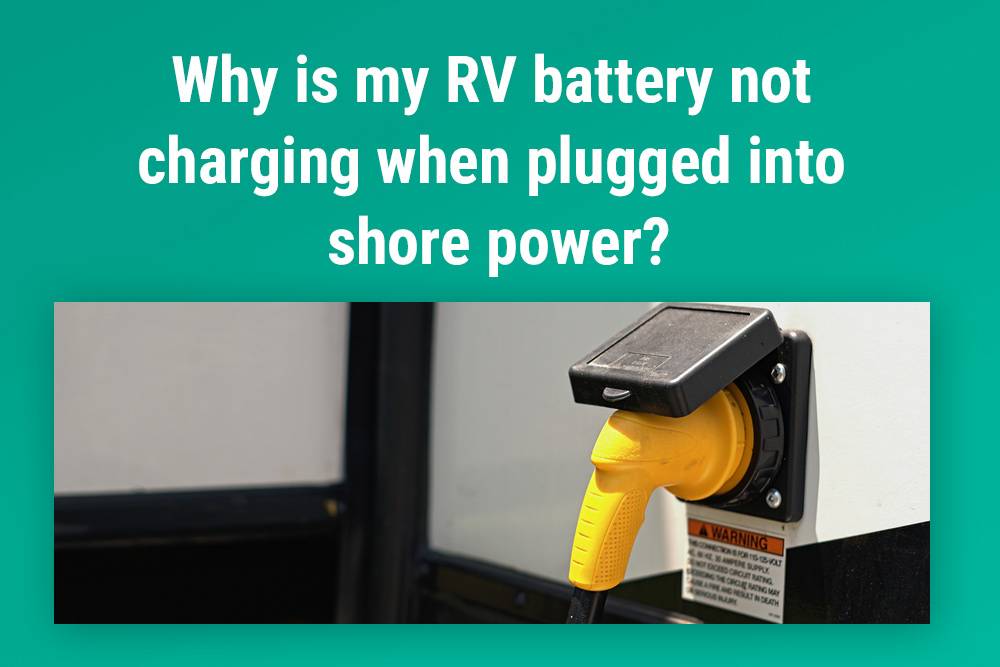
Does the inverter charge the battery in an RV? Inverters typically do not charge the battery in an RV. Instead, they convert DC power from the battery into AC power to run appliances and electronics when shore power is not available.
How do I know if my RV battery is bad? Signs of a bad RV battery include slow cranking or difficulty starting the engine, low voltage readings, sulfation buildup on the battery terminals, and a shortened lifespan compared to the expected battery lifespan.
How do I keep my RV battery charged while camping? Keeping the RV battery charged while camping can be achieved by using solar panels, a generator, or running the RV’s engine periodically to recharge the battery. It’s also essential to conserve battery power by minimizing usage of high-power appliances.
Should my truck charge my RV battery? Some trucks are equipped with auxiliary charging systems that can charge an RV battery while towing. However, it’s essential to ensure that the charging system is compatible and capable of providing sufficient voltage and current to charge the battery effectively.
Can I put 3 batteries in my RV? Yes, it’s possible to install three batteries in an RV, but it’s essential to ensure that the RV’s electrical system, including the charging system and wiring, can accommodate the additional battery capacity without overloading.
How do I know what size battery I need for my RV? Determining the appropriate size battery for an RV depends on factors such as the RV’s power requirements, the number of appliances and devices onboard, and expected usage patterns. Consulting the RV’s owner’s manual or seeking advice from a knowledgeable professional can help determine the correct battery size.
What is the best type of battery to use in an RV? The best type of battery for an RV depends on factors such as budget, performance requirements, and expected usage patterns. Lead-acid batteries (flooded, AGM, or gel) are common and affordable, while lithium-ion batteries offer superior performance and longer lifespan but come at a higher cost.
What are the longest lasting RV batteries? Lithium-ion batteries are known for their long lifespan compared to traditional lead-acid batteries. While they are more expensive upfront, lithium-ion batteries can last significantly longer and provide better performance in various conditions.
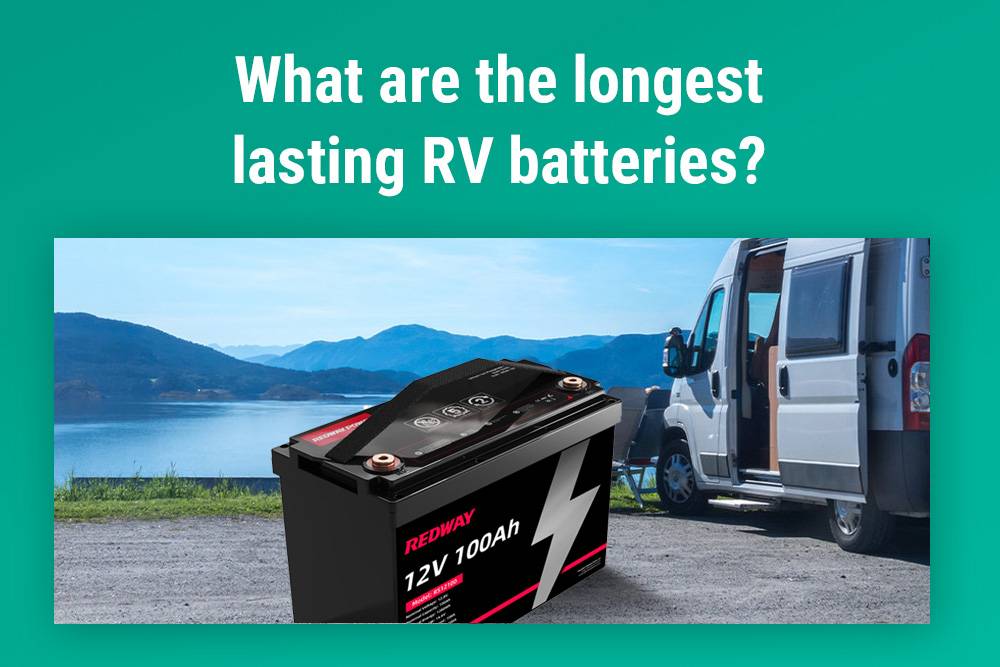
Why do RVs have two batteries? RVs may have two batteries to increase overall battery capacity and provide redundancy in case one battery fails. This setup ensures a reliable power supply for the RV’s onboard systems and appliances, especially during extended trips or boondocking.
What is the most common RV battery? The most common RV battery is the lead-acid battery, which comes in various types such as flooded, AGM (Absorbent Glass Mat), or gel. These batteries are widely used due to their affordability and availability, although lithium-ion batteries are gaining popularity for their superior performance and lifespan.
Can I replace my RV battery with LiFePO4 without replacing my charge controller? Yes, you can typically replace your RV battery with a LiFePO4 battery without needing to replace your charge controller. LiFePO4 batteries have similar voltage requirements to traditional lead-acid batteries, so your existing charge controller should be compatible. However, it’s always a good idea to consult your manufacturer’s specifications or a professional to ensure compatibility and proper installation.

